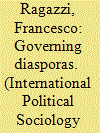| Srl | Item |
| 1 |
ID:
092296


|
|
|
|
|
| Publication |
2009.
|
| Summary/Abstract |
The study of migration in general and in IR in particular has generally meant the study of immigration. Yet, sending states increasingly manage and govern numerically impressive "diasporas" abroad. This article assesses the importance of the government of emigrants and diasporas, and reviews the meager theoretical literature on the topic. It then proposes a theoretical framework based on the concept of governmentality and outlines some avenues for further research.
|
|
|
|
|
|
|
|
|
|
|
|
|
|
|
|
| 2 |
ID:
134476


|
|
|
|
|
| Summary/Abstract |
When it comes to anticipating terrorism, do recent technological advancements fundamentally change the modus operandi of intelligence services? Recent scholarship has focused on the new modes of reasoning brought about by ‘hi-tech’ forms analysis such as data mining, graph visualization and the algorithmic treatment of big data. While this article recognizes the increasing influence of these techniques, it argues they should not overshadow much more low-tech modalities through which a large part of counterterrorism work takes place. Low-tech counter-terrorism, based on qualitative methods and conjectural reasoning, still matters. Drawing on the case of French domestic intelligence services and based on qualitative interviews, observations and declassified documents, this article shows that the practices of security professionals, rooted in traditional institutional habituses developed over time, are largely in continuity with previous ‘low-tech’ forms of police work. In a context in which the uses of digital security technologies have generated discussions about politics and ethics, this article suggests that traditional techniques of intelligence gathering and processing therefore still merit a great amount of attention.
|
|
|
|
|
|
|
|
|
|
|
|
|
|
|
|